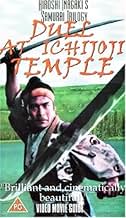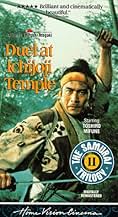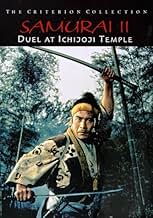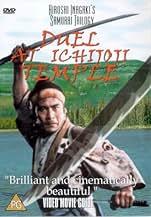Samurai II: Duel at Ichijoji Temple
Original title: Zoku Miyamoto Musashi: Ichijô-ji no kettô
IMDb RATING
7.3/10
7.4K
YOUR RATING
Musashi Miyamoto returns to Kyoto after years of absence. After a series of fights against the Yoshioka School, he challenges its master to a duel.Musashi Miyamoto returns to Kyoto after years of absence. After a series of fights against the Yoshioka School, he challenges its master to a duel.Musashi Miyamoto returns to Kyoto after years of absence. After a series of fights against the Yoshioka School, he challenges its master to a duel.
7.37.4K
1
2
3
4
5
6
7
8
9
10
Featured reviews
Musashi: Books of Water through Void
The first part of the trilogy was setting up the story, visually resplendent but leaves you out in the open. In this second part the direction is solidified. Musashi is set up to choose between the way of the sword or love for the girl Otsu, while having to face his nemesis, foreshadowed for the closing chapter.
What puts me off this second chapter, which I rate the lowest of the three, is that we had a set of characters in the first film, and suddenly we have another set of characters. The film revolves around his feud with the Yoshioki school.
So in a way, this loose narrative foreshadows the third chapter. As it emerges in this second film, the film is not one long epic split in three parts. Neither is each of these first two films self-enclosed. The narrative is a loose stitching together of episode and digress, thrust and feint in many directions; observant viewers will notice the same in the elliptical shooting mode.
I will not say more about this as a film since we are still halfway there, instead let's look at some context around the film, here on the fluidity of self.
--
This is a core precept of Buddhism, which features prominently in the films; Musashi receives key lessons by monks, his journey is one of self-realization, internal abating of ego.
This fluidity is seen in the transmission and establishment of Buddhism in Japan over several hundred years through several attempts, several travels of Japanese monks in China. Both notable Zen schools in Japan were initiated by monks of the Tendai sect who had been to China. The film's main two centerpieces take place outside Buddhist temples (one is referenced in the title, the other is Sanjusangen-do), both belonging to Tendai. The Sanjusangen-do, a marvelous structure, is also famous for housing one thousand and one statues of the thousand armed Kannon, the boddhisatva of compassion. The little wooden statuette that Musashi is seen carving in spots is of Kannon.
Now simply saying that the self is illusory sounds weird, metaphysical or philosophical at best. Buddhists have many of the same lofty words as we do, about 'void' and 'self', but whereas we're accustomed to theoretical construction and analytical philosophy (we love words in the West), they resort to words as a last means of describing a practice—also evident in Musashi's own writings where he stresses experiential appreciation.
So when they say 'void', they don't mean a generality but something which can be felt, has been felt, as one feels the temperature of water. When they say 'self', they mean when a single thought arises while you're washing the dishes.
It's a pain in the ass to talk of it, because how can you say exactly how warm it is? It either is to you or isn't. Stick your hand in. Zen Masters (as well as Musashi whose 'Way of strategy' is Zen-flavored) knew this, which is why they loved paradox, urged silence or beat and kicked their students when they asked logical questions. The point is to know for yourself. A similar thing happens to Musashi in the first film when he is tied by a Zen monk from a tree, a fictional event.
This monk, Takuan, existed; though his interactions with Musashi in the film are fiction, presumably he did know Musashi. He wrote on this business of illusion and nonself using sword metaphors, because the writings were intended for Yagyu Munenori, sword instructor to three shoguns and with Musashi the most famous swordsman in his day. Munenori briefly appears in the third film.
Munenori and Musashi both wrote books with background in all this. Both are still being widely read in the martial arts and business worlds, by people looking for insights on real or metaphorical war.
Musashi's first four books comprise technique and strategy. The last one and shortest, Book of the Void, which is held in separate esteem, probably because of the portentous title, is where Musashi speaks of the Zen void as deeper principle—it should be the most interesting but isn't, Musashi's practical conveyance falls short. No, it's the books on strategy that deserve study once you look past hand-to-hand combat, at least for our purposes here.
Suffice to say, both Zen and Musashi urge direct observation of mind instead of general reasoning. Suffice to say, from the perspective of Zen a Kannon statue is no more sacred than the piece of wood it was carved from. And that the act of carving is the manifestation of self, this can be practically observed in the carved image—is it sloppy, elegant? This is important. So neither spoken word, nor teachings in a book, nor sacred image, nor Zen or not Zen, but observation of the mind behind. I'm going to wrap this in the third post.
What puts me off this second chapter, which I rate the lowest of the three, is that we had a set of characters in the first film, and suddenly we have another set of characters. The film revolves around his feud with the Yoshioki school.
So in a way, this loose narrative foreshadows the third chapter. As it emerges in this second film, the film is not one long epic split in three parts. Neither is each of these first two films self-enclosed. The narrative is a loose stitching together of episode and digress, thrust and feint in many directions; observant viewers will notice the same in the elliptical shooting mode.
I will not say more about this as a film since we are still halfway there, instead let's look at some context around the film, here on the fluidity of self.
--
This is a core precept of Buddhism, which features prominently in the films; Musashi receives key lessons by monks, his journey is one of self-realization, internal abating of ego.
This fluidity is seen in the transmission and establishment of Buddhism in Japan over several hundred years through several attempts, several travels of Japanese monks in China. Both notable Zen schools in Japan were initiated by monks of the Tendai sect who had been to China. The film's main two centerpieces take place outside Buddhist temples (one is referenced in the title, the other is Sanjusangen-do), both belonging to Tendai. The Sanjusangen-do, a marvelous structure, is also famous for housing one thousand and one statues of the thousand armed Kannon, the boddhisatva of compassion. The little wooden statuette that Musashi is seen carving in spots is of Kannon.
Now simply saying that the self is illusory sounds weird, metaphysical or philosophical at best. Buddhists have many of the same lofty words as we do, about 'void' and 'self', but whereas we're accustomed to theoretical construction and analytical philosophy (we love words in the West), they resort to words as a last means of describing a practice—also evident in Musashi's own writings where he stresses experiential appreciation.
So when they say 'void', they don't mean a generality but something which can be felt, has been felt, as one feels the temperature of water. When they say 'self', they mean when a single thought arises while you're washing the dishes.
It's a pain in the ass to talk of it, because how can you say exactly how warm it is? It either is to you or isn't. Stick your hand in. Zen Masters (as well as Musashi whose 'Way of strategy' is Zen-flavored) knew this, which is why they loved paradox, urged silence or beat and kicked their students when they asked logical questions. The point is to know for yourself. A similar thing happens to Musashi in the first film when he is tied by a Zen monk from a tree, a fictional event.
This monk, Takuan, existed; though his interactions with Musashi in the film are fiction, presumably he did know Musashi. He wrote on this business of illusion and nonself using sword metaphors, because the writings were intended for Yagyu Munenori, sword instructor to three shoguns and with Musashi the most famous swordsman in his day. Munenori briefly appears in the third film.
Munenori and Musashi both wrote books with background in all this. Both are still being widely read in the martial arts and business worlds, by people looking for insights on real or metaphorical war.
Musashi's first four books comprise technique and strategy. The last one and shortest, Book of the Void, which is held in separate esteem, probably because of the portentous title, is where Musashi speaks of the Zen void as deeper principle—it should be the most interesting but isn't, Musashi's practical conveyance falls short. No, it's the books on strategy that deserve study once you look past hand-to-hand combat, at least for our purposes here.
Suffice to say, both Zen and Musashi urge direct observation of mind instead of general reasoning. Suffice to say, from the perspective of Zen a Kannon statue is no more sacred than the piece of wood it was carved from. And that the act of carving is the manifestation of self, this can be practically observed in the carved image—is it sloppy, elegant? This is important. So neither spoken word, nor teachings in a book, nor sacred image, nor Zen or not Zen, but observation of the mind behind. I'm going to wrap this in the third post.
Classic Jidai Geki
The tale of Myamoto Musashi - thief, lover, rogue, then warrior, hero and master - is enshrined in Japanese culture, perfect showcase material as it were. It has been adapted more than once to the screen, and Inagaki's classy, colorful version is perhaps the best known. It is everything you'd expect from a period samurai film if you've never seen one and harbor no negative preconceptions.
After a playful first part that has a classic hero's journey structure, part II takes things to the next level without having to rush to the finish, and is the more interesting film. It allows the hero to wield his newfound power without the restraint and inner peace he will later find. It allows him the get mad, and nobody does unleashed fury like Toshiro Mifune, not when you throw 80+ armed fools in this way.
I chose to review this one because it is a good sample of the very best this trilogy accomplishes: compelling archetypical characters, lush cinematography and that "oriental" elegance that always seduces non-Japanese audiences, drawn in as they are by the very universal plot and character dynamics.
I cannot put it in the same leagues as the masterpieces of Kurosawa, Ozu and Kobayashi, but if it is to be a gateway film experience, then it is a bloody good one, and laudable for what it accomplishes.
You might really enjoy this, and if you do, it's just the beginning!
After a playful first part that has a classic hero's journey structure, part II takes things to the next level without having to rush to the finish, and is the more interesting film. It allows the hero to wield his newfound power without the restraint and inner peace he will later find. It allows him the get mad, and nobody does unleashed fury like Toshiro Mifune, not when you throw 80+ armed fools in this way.
I chose to review this one because it is a good sample of the very best this trilogy accomplishes: compelling archetypical characters, lush cinematography and that "oriental" elegance that always seduces non-Japanese audiences, drawn in as they are by the very universal plot and character dynamics.
I cannot put it in the same leagues as the masterpieces of Kurosawa, Ozu and Kobayashi, but if it is to be a gateway film experience, then it is a bloody good one, and laudable for what it accomplishes.
You might really enjoy this, and if you do, it's just the beginning!
Light, Fleeting Lectures on an Overly-Familiar Theme
The follow-up to 1954's excellent Musashi Miyamoto, Duel at Ichijoji Temple picks up the story several years later, as an exiled orphan-turned-swordsman gains notoriety via a bloody tour of fatal duels. His reputation precedes him in returning to his hometown, where old rivals of both a violent and intimate nature await. This is a film about personal growth - specifically that of the samurai himself, who struggles to learn the key concepts of what his new life actually entails and where the rift lies between honor and reverence. We're never quite sure if Musashi takes this lesson to heart, particularly since he's so keen to maintain an impenetrable outer facade in almost every situation. It's a tricky role for period veteran Toshiro Mifune, who struggles with the more nuanced, flatter aspects of the character. In the previous episode, with the fires of young-adulthood to toy with, he excelled. Here, faced with the malaise of mid-life and the accompanying questions of his own being, his performance is far less sublime. The plot, cramped with too many faces and several seemingly-pointless subplots, does him no favors in dancing around the issues and repeating itself on more than one occasion. This could have been an excellent one-act show, and the final half-hour could still stand alone as precisely that. It lacks the gumption of its predecessor, however, and too often cuts away just as the action is getting good.
Solid sequel
Samurai II picks up where the first film left off; Takezo, now Miyamoto Musashi (Toshiro Mifune) has been released by the priest and is clearly more disciplined after having absorbed his teaching. After we see him dispatch a foe swinging a wicked kusarigama, however, an old man who's witnessed the affair comments that he lacks chivalry, and taking this next step in his development is the subject of this installment in the trilogy. Mifune is wonderful and joined by many of the characters from the first film, as well as the leader of an unscrupulous samurai school (Akihiko Hirata) and another samurai, Sasaki Kojiro, who is clearly on the path to higher development (Koji Tsuruta). Unfortunately, while there are some really fine moments, narratively the film is bit tangled, which kept me from truly loving it.
For one thing, I think it was a mistake to have Musashi meet Otsu (Kaoru Yachigusa) again so early in the story, then to have another dramatic scene where he tells her he's chosen the way of the sword instead of the way of love, since this had already had been done with great effectiveness at the end of the first film. Later he's also tempted by a courtesan in a scene reminiscent of the widow and her daughter trying to seduce him, and naturally, he rebuffs her too. The main story line is Musashi and it consists mostly of him turning down women throwing themselves at his feet or being hunted by his enemies, which I didn't find all that creative.
Meanwhile, there are lots of other subplots, none of which are satisfying. There is one involving the widow's daughter (Mariko Okada), who is in part a sympathetic character because she's prostituted by her own mother, but also in part a villain, lying to Otsu by telling her that Musashi is hers, and trying to steal him as she did with Otsu's fiancé Matahachi (Sachio Sakai) in the first film. The cowardly Matahachi has fallen into ignominy, and along with his venomous mother become threats out of "honor" to the family name. A brother to the leader of the samurai school gets in the act and also wants to challenge Musashi out of honor. While there is a lot of talk about honor from these kinds of characters, what we actually see is a lot of dishonorable behavior from everyone other than Musashi, Otsu, the priest, and Sasaki. I liked the contrast formed between good and evil, but just felt the number of characters involved could have been reduced to allow for more depth on the others. I have to say, I also disliked the ending, and not just because it was predictable. It's great that Musashi knows that "no means no," and it's a contrast to the rape another man commits earlier in the film, but his response was also pretty flawed.
All of that complaining aside, this is certainly a decent samurai film and it had its moments. Even though the film didn't seem to have a terribly large budget and the scenes shot at the studio are obvious, the cinematography is excellent. The swirling scenes leading up to battle and how colors are often contrasted with dark backgrounds are wonderful. The final battle sequence out in the rice paddy was very well filmed, and the taut precision of the samurai form was beautifully brought out by Mifune. From the perspective of craftsmanship it may be better than the first film, but from the perspective of narrative, it was a step down. Still, it's worth seeing.
For one thing, I think it was a mistake to have Musashi meet Otsu (Kaoru Yachigusa) again so early in the story, then to have another dramatic scene where he tells her he's chosen the way of the sword instead of the way of love, since this had already had been done with great effectiveness at the end of the first film. Later he's also tempted by a courtesan in a scene reminiscent of the widow and her daughter trying to seduce him, and naturally, he rebuffs her too. The main story line is Musashi and it consists mostly of him turning down women throwing themselves at his feet or being hunted by his enemies, which I didn't find all that creative.
Meanwhile, there are lots of other subplots, none of which are satisfying. There is one involving the widow's daughter (Mariko Okada), who is in part a sympathetic character because she's prostituted by her own mother, but also in part a villain, lying to Otsu by telling her that Musashi is hers, and trying to steal him as she did with Otsu's fiancé Matahachi (Sachio Sakai) in the first film. The cowardly Matahachi has fallen into ignominy, and along with his venomous mother become threats out of "honor" to the family name. A brother to the leader of the samurai school gets in the act and also wants to challenge Musashi out of honor. While there is a lot of talk about honor from these kinds of characters, what we actually see is a lot of dishonorable behavior from everyone other than Musashi, Otsu, the priest, and Sasaki. I liked the contrast formed between good and evil, but just felt the number of characters involved could have been reduced to allow for more depth on the others. I have to say, I also disliked the ending, and not just because it was predictable. It's great that Musashi knows that "no means no," and it's a contrast to the rape another man commits earlier in the film, but his response was also pretty flawed.
All of that complaining aside, this is certainly a decent samurai film and it had its moments. Even though the film didn't seem to have a terribly large budget and the scenes shot at the studio are obvious, the cinematography is excellent. The swirling scenes leading up to battle and how colors are often contrasted with dark backgrounds are wonderful. The final battle sequence out in the rice paddy was very well filmed, and the taut precision of the samurai form was beautifully brought out by Mifune. From the perspective of craftsmanship it may be better than the first film, but from the perspective of narrative, it was a step down. Still, it's worth seeing.
The screening of these 3 films was a national event in the 1950s.
This comment about the "Samurai Trilogy" starts on the page for Miyamoto Musashi (Samurai I). My first viewing of the second episode was memorable because I got to take the train into town all by myself, and view it in a Tokyo theater. The first episode had just been shown on base, in a sort of cultural exchange, and my parents saw it and were pleasantly non-outraged-- I was a 9-year-old samurai-movie addict, and they believed enthusiasm beyond a certain intensity should be curbed. It was the same conflict as comic books some few years earlier. Technicolor was a big deal back then, especially in Japan, and it became the issue on which my viewing of "swordfighting movies" was decided-- the ones in color were historical films worth viewing, and even had something to teach. The black-and-white ones shown in Irumagawa and surrounding villages-- I had to sneak off to see. Ichijoji no Ketto (Duel at Ichijoji Temple) shows Miyamoto-san's achievements, while barring no holds on the issue of what they cost him. The romantic subplot continues, though its development in the western sense (toward union, wedded bliss) is thwarted at every turn. The issue is always a conflict between love and duty, and each deferment of gratification spells out a new step in the redefinition of the national character that is being mapped here. Again, some of the importance of all this is lost, even to modern Japanese audiences for whom the issues are long settled-- at the time, though, they were cliffhangers. A new character is introduced, Kojiro Sasaki who will emerge in part 3 as a rival for Musashi-- his equal except for certain features in their respective character. By the way, the score is excellent and haunting-- it extends like a symphony through all three parts, and has a leitmotif "hook" that will cause your ears to pick up in recognition, perhaps years from now, when you hear it again.
Did you know
- TriviaMusashi Miyamoto (Toshiro Mifune) is seen carrying two swords. This was a samurai custom known as daisho. Translated this means 'big-little'. The bigger of the two blades was the curved katana, which was generally used for combat and duelling. The short sword was the wakizashi, this blade was generally associated with committing seppuku, however, as can be seen in the film was also used for combat.
- GoofsMany of the guys killed in swordplay go down with either no visible contact between their bodies and a katana, or appear to be hit in the arm or leg with a non-fatal slash that stills ends them, regardless.
- Quotes
Musashi Miyamoto (Takezo): I renounce my love of women.
- ConnectionsFeatured in Samurai III: Duel at Ganryu Island (1956)
- How long is Samurai II: Duel at Ichijoji Temple?Powered by Alexa
Details
- Release date
- Country of origin
- Language
- Also known as
- Duel at Ichijoji Temple
- Filming locations
- Production company
- See more company credits at IMDbPro
- Runtime
- 1h 44m(104 min)
- Sound mix
- Aspect ratio
- 1.37 : 1
Contribute to this page
Suggest an edit or add missing content







































